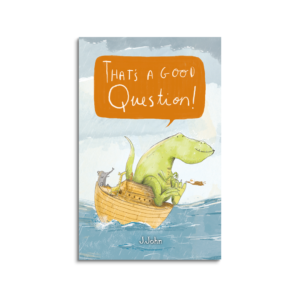RICKMANSWORTH, UNITED KINGDOM (ANS) — One of the most endearing and exhausting features of children is their questions.

“You know the sort of thing: ‘Why do I have two eyes if I only see one thing?’ or ‘Why don’t you have enough hair?’ This curiosity is natural and good; after all, we read that the boy Jesus questioned the teachers in the temple (Luke 2:46),” says British evangelist Canon J. John.
Note: Please help Assist News Service to be a voice for Christians around the world. Donate to ANS today
J.John is described as a creative speaker with an appeal that transcends gender, age, race, culture and occupation. His much-loved art of storytelling helps people to discover spiritual meaning in a way that makes sense of everyday life. J.John has been speaking about the relevance of Christianity since 1975.
“A child’s curiosity is generally unconstrained by embarrassment, hence parents face such questions as ‘Why is Grandad so fat?’ and ‘When are you going to die?’ This wonderful naïvety extends to God. Here children’s questions can often be profound, bizarre or both: for instance ‘Who made God?’ or ‘Will I sneeze in heaven?’” J.John said.
The evangelist continued: “I’ve had a long-standing interest in how children learn about God and we have published a series of books entitled Theology For Little People. To specifically address this curiosity about God, I’ve just written a book entitled That’s a Good Question! Many people might imagine that in a world apparently too complex for adults to explain, bothering with children’s questions may seem to be childish. But it isn’t. Questions are a child’s way of exploring this extraordinary world that they have found themselves in. The results of these childhood queries are not just vital, they are also enduring. The human mind behaves like slow-setting concrete and how a child shapes their view of God in a mind still fluid can, for good or bad, persist in a rigid form throughout their lives. How many atheists have rebelled, not against the biblical God, but against some imaginary tale that they were fed in infancy?”
J.John says he believes that children’s questions about God deserve the very best answers. He suggested three principles.
“My first principle is that we have a commitment to dealing with questions about God. I think we need to be committed in terms of time. We live in an age where communication with children has been squeezed to the minimum.
“In busy lives it’s all too easy to allow children to switch off and immerse themselves instead in electronic media of whatever sort. What we might call ‘God questions’ should not be shelved. We need to engage with children and give them time to ask questions and us time to answer them properly. Let’s make space for grace!”
J.John said that commitment to ‘God questions’ should extend to quality.
“Make it a rule: God questions deserve good answers. Some children’s questions may be based on something misunderstood or misheard and are easily answered: for example, ‘Why do people go to Devon [a county in Southern England – Ed.] when they die?’ Others, such as ‘Where does God live?’ or ‘Why can’t we see God?’ are demanding and require a wise answer expressed in a way that can be understood.
“Actually, the best response to some brain-stretching enquiry may be, ‘Good question! Let me think about that and I’ll try to answer it very soon.’ (And if you say that, keep your promise!). Better to give a child the right answer tomorrow than the wrong one today.”
J.John said his second suggestion is that such questions are treated as part of a conversation.
“So in the first place ‘God questions’ should be treated naturally. Sometimes parents get embarrassed here because they haven’t thought through the issues themselves. The trouble is that children are not fools and can sense in some unnatural or laboured response that this is not a topic where questions are welcome.
“Another important conversational aspect is that, if at all possible, we seek to develop such questions. All answers can either be closed or open: closed answers shut down any discussion, while open answers invite a further response. So there’s a lot to be said for a reply which says something like ‘That’s my answer. But what do you think?’ Answers should stimulate the questioner, not silence them.”
J.John’s third suggestion is that we respond with confidence.
He said: “Precisely because children are sensitive to uncertainty and unbelief, how we answer their questions is important. The basis of our response is particularly important because our goal in answering children’s questions should not simply be giving them an answer but in modelling how such questions are to be answered in the future. Here I have no hesitation in saying that our responses need to be based on the authority of the Bible as God’s revealed truth.”
J.John said the reality is that if we don’t teach our children about the things of God, then they will be taught about them by our culture. He knows which he prefers.
According to J.John’s website, children’s questions about God are vital and demand the best answers we can give. He asks us not to cheat the adults of tomorrow by failing our children today.
Cover artwork for That’s a Good Question!

In order to meet this need, J.John has a new book That’s a Good Question!
He asked ten children to send him their questions about God, Jesus and the Bible, and received seventy! He selected thirty-two of the questions and endeavoured to give clear and concise answers with some serious pondering.
“This has been a stimulating, challenging and hugely rewarding exercise!” he said.
J.John said he originally had in mind children aged from 8 to 11 years, but had a lot of feedback from adults regarding the titles in his Theology For Little People series – Knowing God, The Easter Story and The Christmas Story – who have expressed their joy at reading the books to even younger children and gaining for themselves a fresh understanding of these timeless stories.
J.John concluded: “I have a sense that this new children’s book will not only appeal to children – not least with its amazing and creative illustrations – but to adults, too, whether parents, grandparents, aunts, uncles or friends.”
For more information: https://canonjjohn.com/product/thats-a-good-question/






